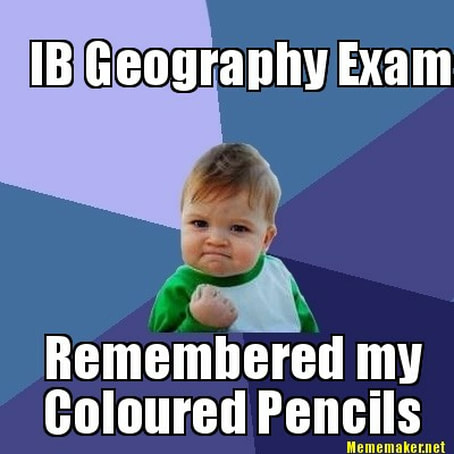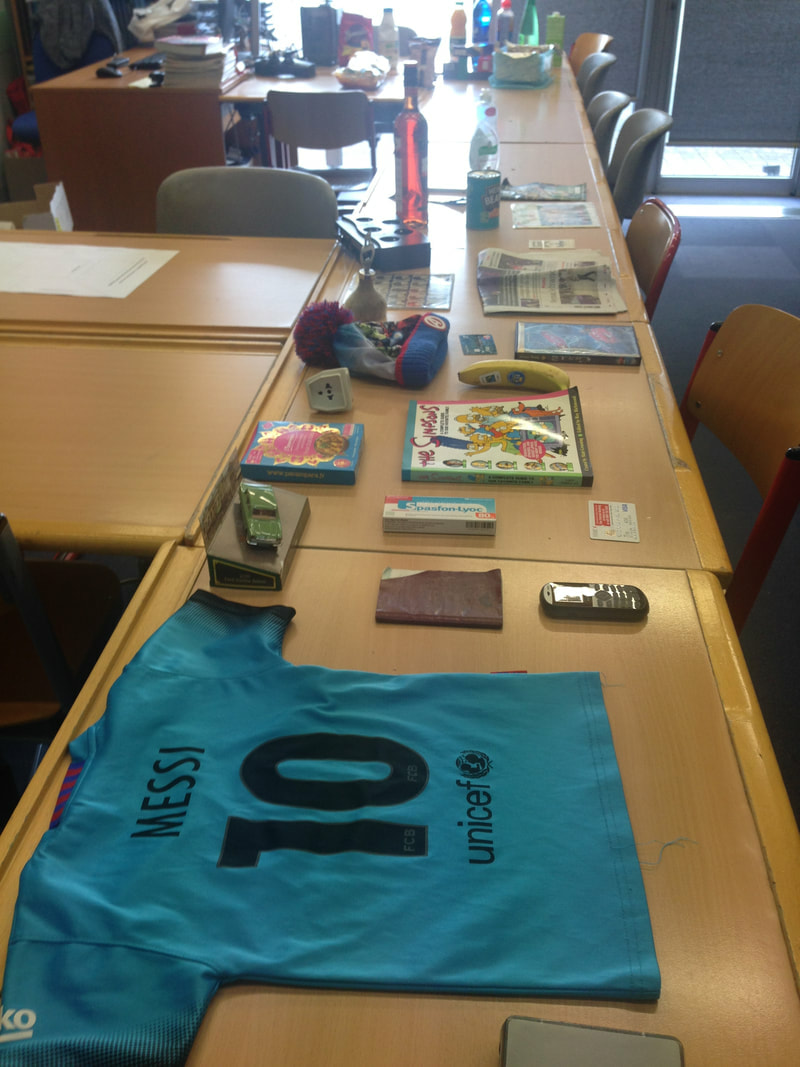IB Geography Examinations.
There are two examination papers for SL students (Paper 1 & 2) and three for HL students (Paper 1, 2 & 3)
Paper 1 - Themes.
This exam is based on the optional themes that you have chosen to study. The first section of each optional question is worth 10 marks and contains a series of structured questions based around a graphic / map to test knowledge & understanding.
The section section has two 10 mark essay questions. You choose to answer one only.
Each option question will take you 45 minutes to complete.
SL answer two questions. HL answer three questions
Total time SL 1 hour 30 mins, HL 2 hours 15 mins
Paper 2 - Global Change
This exam is split into three sections, A, B & C.
Section A contains question 1, 2 & 3. These are the short response questions from the Core (Population, Climate & Resources). There are 30 marks available here. Time taken 35 minutes.
Section B contains question 4 and is a visual stimulus question. There are 10 marks available for this question and the activities will test you ability to read and critique a graphic that will be present in your exam insert booklet. Time taken, 10-15 mins
Section C contains question 5 and 6. Both these questions are 10 mark essay questions and you will be required to answer ONE QUESTION only. The questions will likely link together two or more parts of the core (e.g. climate change and population movement). Time taken 20 minutes.
Total 50 marks & 1 hour 15 mins
Paper 3 - Global Interactions
This paper is completed by HL students only.
The paper contains 3 combination questions. Each combination has a 12 and 16 mark essay to complete. The 12 mark question is often focused on a specific area of the Interactions unit whereas the 16 mark question will allow you to link in many different parts of the IB course to effectively answer the question. You answer one combination only.
Total 28 marks & 1 hour
There are two examination papers for SL students (Paper 1 & 2) and three for HL students (Paper 1, 2 & 3)
Paper 1 - Themes.
This exam is based on the optional themes that you have chosen to study. The first section of each optional question is worth 10 marks and contains a series of structured questions based around a graphic / map to test knowledge & understanding.
The section section has two 10 mark essay questions. You choose to answer one only.
Each option question will take you 45 minutes to complete.
SL answer two questions. HL answer three questions
Total time SL 1 hour 30 mins, HL 2 hours 15 mins
Paper 2 - Global Change
This exam is split into three sections, A, B & C.
Section A contains question 1, 2 & 3. These are the short response questions from the Core (Population, Climate & Resources). There are 30 marks available here. Time taken 35 minutes.
Section B contains question 4 and is a visual stimulus question. There are 10 marks available for this question and the activities will test you ability to read and critique a graphic that will be present in your exam insert booklet. Time taken, 10-15 mins
Section C contains question 5 and 6. Both these questions are 10 mark essay questions and you will be required to answer ONE QUESTION only. The questions will likely link together two or more parts of the core (e.g. climate change and population movement). Time taken 20 minutes.
Total 50 marks & 1 hour 15 mins
Paper 3 - Global Interactions
This paper is completed by HL students only.
The paper contains 3 combination questions. Each combination has a 12 and 16 mark essay to complete. The 12 mark question is often focused on a specific area of the Interactions unit whereas the 16 mark question will allow you to link in many different parts of the IB course to effectively answer the question. You answer one combination only.
Total 28 marks & 1 hour
Activity 1 - Where's the Geography in this?
To encourage you to use your synthesis skills, this activity will require that you pick an item from the front desk and use the A3 template sheet below to show how it links to different parts of the SL & HL course.
There are some unusual items in there and you should be careful to think carefully about how it connects different parts of the course.
You will be given 5 minutes to study the item carefully. You must make quick notes in the framework sheet below of where the item links into your IB DP Geography course, starting with the 4P's and the SDG's.
You will then be given a further 10 minutes to come up with a one minute speech that answers the following question:
Evaluate the geographical impact that (enter your item here) has had on the world in the last 20 years.
Outcome: To be able to think quickly and logically about which combination of case studies fits with the essay based questions
Activity 2 - Key Command Terms
Students will often ask for a refresher of the command terms in the Geography exams, namely A02 - A03. The document beneath can be printed out and cut up to complete a brief mix and match activity that can provoke discussion, especially the differences between compare and contrast.
Another approach would be to use this excellent Kahoot from Richard Allaway that tests the students ability to mix and match against the clock!
HL students should read the section at the bottom of this paper on essay command terms so that you understand the difference between a 12 and 16 mark essay.

Understanding text in exam questions:
- Referring to: using, mentioning explicitly
- Outcome: consequence, result
- Benefits/costs: positive/negative outcomes
- Pressures/conflicts: undesirable competition
- Challenges: difficulties which may be overcome
- Social: relates to human welfare (e.g. housing, health)
- Cultural: relates to languages, customs, religions, moral codes
- Political: relates to government actions
- Demographic: relates to populations (e.g. fertility)
- Environmental: relates to the physical environment
- Issues: important and controversial results
- Trend: change over time (usually on a graph)
- Pattern: distribution in space (IE: can be mapped)
- Process: actions or changes which occur between two parts/stages
- Relationship: two-way interactions
- Global scale: the entire world
- Regional scale: large regions (e.g. Europe, Asia Pacific)
- National scale: within one country
- Local scale: immediate district or state
Source: https://www.geoib.com/command-terms.html
Activity 3 - Question Spotting 2024
Below you will find documents updated in March 2024 with lists of Paper 1, 2 & 3 IBDP Geography questions that have already featured in the external exams since May 2019 (first assessment of this syllabus). The document shows which areas of the syllabus that have had both short response and 10-mark questions, and also those areas of the syllabus that have not seen much question activity. There are potential questions in the red column on the right hand side of each sheet to help to focus your revision. All the sheets are editable.
Paper 1 - Themes
Paper 2 - Global Change
Paper 3 - Global Interactions (HL Only)
Activity 4 - How to revise
This revision guide, specific to Geography was recently written in the IB Review Magazine. It comes in two parts but you should take some time to read both sections by clicking on the links below.
Part 1
Part 2
Part 1
Part 2
Activity 5 - Revising HL Content
Here, you will find three Kahoot quizzes. The Freshwater quizzes have been produced by Richard Allaway over at geographyalltheway and the SL Core quiz is based on my work here in Toulouse.
Activity 6 - Revising SL Content
Here you will find two Kahoot quizzes. One for Urban and the other for Core Global Change (population, climate & resources).
Activity 7 - Essay Questions
|
|
|
Look carefully at the essay title and carry out the following:
Underline the key words in the title
(note that some of the items in the L.I.S.T. may not be relevant to the essay)
Making a great start to the essay
A good introduction must be brief and include the following 3 elements:
Define the key words of the title (e.g. "globalization", "physical water scarcity", "megacity")
Formulate the question: use or rephrase the essay title, suggest possible sub-questions which may be relevant to the essay
Announce the structure/plan that will be used to answer the question: however do NOT "conclude" by giving away your key arguments in the introduction. Rather, indicate the path you'll follow (e.g. "we will first examine this aspect, then evaluate this this aspect, and finally look into this aspect"). Don't be afraid to mention the relevant 4P's & SDG's and underline them too to draw attention to the
Skip 3-4 lines after the introduction so that there is no doubt for the reader that you are know beginning the body of the essay.
Source: https://www.geoib.com/essays.html
SL Essay Advice
Paper 1 - Themes - You will answer (HL - 3 and SL - 2) questions in total. Each question is split up into a structured section worth 10 marks followed by a choice of one of two 10 mark essay questions. The 10 mark essay questions will include A03 command terms. These WILL REQUIRE YOU to make a judgment based on evidence and when relevant construct an argument.
Paper 2 - You will answer one of two 10 mark questions. The questions should contain an A03 command term such as 'To what extent'...
Mark scheme for 10-mark question - here
HL Essay Advice
Look again carefully, the 12 mark questions are generally AO2 (analyse, explain etc)
Paper 3 - The 16 mark ones are only AO3 (Examine, discuss etc). These WILL REQUIRE YOU to make a judgment based on evidence and when relevant construct an argument.
The mark scheme for each 12 & 16 mark question is different. Synthesis and evaluation is not required for 12 marks but is for 16 marks . In effect, one is a high scoring short answer the other is an essay (source - Tom Sheard IB DP Teacher)
Mark Scheme For 16-mark question - here
Mark Scheme For 12-Mark question - here
Underline the key words in the title
- Use the L.I.S.T. checklist below to ensure that you give the essay title its broadest interpretation:
- L – LOCATION (spatial context): poor/rich countries; rural/urban areas;
- tropical/temperate; land/air/sea; marine/terrestrial/atmospheric
- I – ISSUES (factors): positive/negative, advantages/disadvantages, costs/benefits,
- human/physical, environmental, social, cultural, demographic, political,
- economic, geographic
- S – SCALE: global, regional, international, national, sub-national, local
- T – TIME: long-term/medium-term/short-term; past/present/future; contemporary/recent/current
(note that some of the items in the L.I.S.T. may not be relevant to the essay)
Making a great start to the essay
A good introduction must be brief and include the following 3 elements:
Define the key words of the title (e.g. "globalization", "physical water scarcity", "megacity")
Formulate the question: use or rephrase the essay title, suggest possible sub-questions which may be relevant to the essay
Announce the structure/plan that will be used to answer the question: however do NOT "conclude" by giving away your key arguments in the introduction. Rather, indicate the path you'll follow (e.g. "we will first examine this aspect, then evaluate this this aspect, and finally look into this aspect"). Don't be afraid to mention the relevant 4P's & SDG's and underline them too to draw attention to the
Skip 3-4 lines after the introduction so that there is no doubt for the reader that you are know beginning the body of the essay.
Source: https://www.geoib.com/essays.html
SL Essay Advice
Paper 1 - Themes - You will answer (HL - 3 and SL - 2) questions in total. Each question is split up into a structured section worth 10 marks followed by a choice of one of two 10 mark essay questions. The 10 mark essay questions will include A03 command terms. These WILL REQUIRE YOU to make a judgment based on evidence and when relevant construct an argument.
Paper 2 - You will answer one of two 10 mark questions. The questions should contain an A03 command term such as 'To what extent'...
Mark scheme for 10-mark question - here
HL Essay Advice
Look again carefully, the 12 mark questions are generally AO2 (analyse, explain etc)
Paper 3 - The 16 mark ones are only AO3 (Examine, discuss etc). These WILL REQUIRE YOU to make a judgment based on evidence and when relevant construct an argument.
The mark scheme for each 12 & 16 mark question is different. Synthesis and evaluation is not required for 12 marks but is for 16 marks . In effect, one is a high scoring short answer the other is an essay (source - Tom Sheard IB DP Teacher)
Mark Scheme For 16-mark question - here
Mark Scheme For 12-Mark question - here




